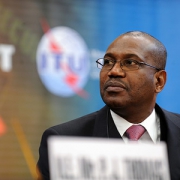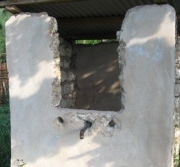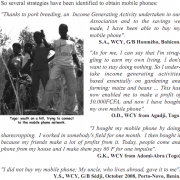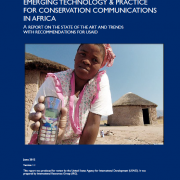How Mobiles Could Revolutionize Data Collection
Collecting baseline data in developing countries can be expensive and require many costs. Also, many have called into question the reliability of the data. To streamline the data collection process, the World Bank and South Sudan are experimenting with a new alternative—data collection by mobile phones, which World Bank director of Economic Policy Marcelo Giugale recently claimed is the “fast track” to actually listening to the poor, and subsequently meeting their needs.
To conduct South Sudan’s national survey for 2011, the year of their independence, World Bank researcher Gabriel Demombynes worked with the Southern Sudan Centre for Census, Statistics and Evaluation and utilized mobile phones as a means to collect the data (a photo essay explaining the survey design can be seen here). In the Southern Sudan Experimental Phone Survey (SSEPS), 100 households in each of the capital cities in South Sudan’s ten states were identified, making for a total sample size of 1000 households. Each household received a free mobile phone. Researchers gave half of the households traditional Nokia phones and the other half solar-powered phones. For four months, the researchers contacted the households by phone and conducted the same survey, while adding a few additional questions each month. Those who answered the phone and participated in the survey were compensated with additional phone time each month; half received five Sudanese pounds of phone credit while the other half received ten pounds.
This innovative survey design allowed researchers to accomplish two purposes: document the current state of South Sudan and experiment with many methods of mobile phone survey data collection. The results of the survey, and of the data collection experiment, will be available as a World Bank “Poverty Assessment” document in the coming months. For now, however, a quick summary of the survey data that has been processed thus far can be downloaded as a “Poverty Profile” of South Sudan. The results demonstrate stark differences between North and South Sudan.
In addition to collecting important data regarding the state of poverty in South Sudan, the study also provides interesting insights about the efficiency and potential of mobile data collection. Dr. Demombynes describes a few insights from preliminary analysis of the data (though these results may be different once all of the data is analyzed in the coming months):
- There was approximately a 50% response rate for the entire four months among all participants.
- Households who had a mobile phone before the survey were much more likely to respond each month to the survey.
- This indicates that other respondents had trouble knowing how to work the phone, lacked service coverage, or were less likely to remember to answer and use the phone without prior exposure.
- More efforts to train respondents on using the mobile phone are necessary and could potentially improve response rates significantly.
- There was no difference in response rates between those who were compensated with five pounds and those who were given ten.
- There was no control group who received no compensation, so it is difficult to say what impact compensation of any form has on response rates.
- There was no significant difference in response rates between those who received a Nokia phone and those who received a solar-powered phone.
- The solar-powered phones perhaps had to be in the sun for too long and could potentially be stolen. Also, although electricity is inconsistent, generators are common and local people know where to go to recharge their phones at affordable prices.
The potential for mobile phones as a means of data collection appears to be valid, as demonstrated by this experiment. However, additional research should be conducted such as a cost-benefit analysis of mobile collection versus traditional survey methods. If successful, then more data can be collected about the developing world, informing policy and leading to projects that better meet the actual needs of the poor as opposed to their perceived needs.










































